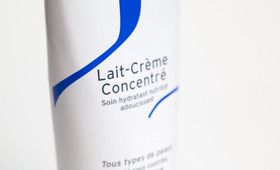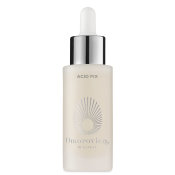
The beauty industry is rife with products claiming to be the fountain of youth in a jar. It seems like every anti-aging cream and serum boasts the silver bullet for signs of aging. In the U.S., non-prescription skincare products are categorized as cosmetics (not drugs), so their marketing claims aren’t regulated as tightly as, say, that eczema cream your derm prescribed for you. In fact, they don’t have to be backed up by scientific research at all.
That doesn’t mean that all anti-aging products are bogus, though. Those formulated with the right research-backed ingredients—i.e., ingredients shown to work in independent clinical studies—can actually help diminish those pesky crow’s feet and smile lines. Ahead, we’ll highlight the anti-aging ingredients that are scientifically proven to target fine lines and wrinkles, so you can judge for yourself if that buzzed-about wrinkle cream is worth the hype.
Retinol
Retinol (aka vitamin A) has a ton of research backing up its anti-aging properties. It works by encouraging skin cells to regenerate, stimulating new collagen production, defending against free-radical damage, and exfoliating the surface of the skin—no wonder it’s a first-line treatment for signs of aging. Studies have shown that percentages as low as 0.1% retinol can visibly improve fine lines and wrinkles and hyperpigmentation.
Editor’s picks: Sunday Riley A+ High Dose Retinoid Serum, EVE LOM Time Retreat Radiance Boost Treatment
Vitamin C
Vitamin C (ascorbic acid) is everywhere, and for good reason. It’s one of the most well-researched skincare ingredients in the game, and it targets quite a few skin concerns, from fine lines and wrinkles to dark spots and dullness. As a powerful antioxidant, it also helps protect skin from free-radical damage. There are many different forms of vitamin C, but straight-up ascorbic acid is the most well-studied.
Editor’s picks: Good Molecules Vitamin C Booster Powder, Farmacy Very Cherry Bright 15% Clean Vitamin C Serum
Peptides
Peptides are short chains of amino acids that occur naturally in the human body. There are many different peptides out there, without more being discovered all the time. Each type of peptide does something different—like sending signals to your skin cells to produce more collagen or assisting in wound healing. Here’s a few that have shown some promise in clinical studies:
-
Argireline: a neuropeptide that inhibits the neurotransmitters that tell your facial muscles to move, resulting in firmer skin and fewer dynamic wrinkles.
-
Copper tripeptide: one of the most well-researched peptides; promotes collagen and elastin synthesis and supports wound healing.
-
Matrixyl: the trademarked name for palmitoyl pentapeptide-4, which stimulates the production of elastin, fibronectin, and collagen to reduce wrinkle volume and depth.
Editor’s picks: Allies of Skin Peptides & Antioxidants Firming Daily Treatment, Good Molecules Super Peptide Serum
Hyaluronic Acid
Found naturally in the skin, hyaluronic acid works by attracting and holding onto water molecules, boosting skin’s moisture content and defending against moisture loss. This rehydration process helps to smooth and plump up the skin’s surface so that wrinkles and fine lines appear less noticeable. Gentle, non-comedogenic and non-irritating, it’s a must-have ingredient for even the most sensitive or acne-prone skin.
Editor’s picks: Dr. Barbara Sturm Hyaluronic Serum, Peter Thomas Roth Water Drench Hyaluronic Cloud Cream Hydrating Moisturizer
Alpha hydroxy acids
When formulated with the right pH, alpha hydroxy acids (AHAs) exfoliate the top layer of skin by breaking down the “glue” that holds dead skin together. This exfoliating process reveals brighter, smoother, younger-looking skin. Of all the AHAs found in skincare, glycolic and lactic acid have the best track record of research. For those with sensitive skin: Lactic acid can’t penetrate quite as deeply as glycolic acid, so it’s a better choice.
Editor’s picks: Omorovicza Acid Fix, Chemist Confessions Baby Steps Acid Treatment
Niacinamide
Also known as vitamin B3, niacinamide has been shown to help minimize the look of pores, improve uneven skin tone, smooth out rough texture, and soften fine lines and wrinkles. It also helps strengthen the skin’s protective barrier to prevent dehydration and water loss. Talk about an all-star ingredient! Even if you’re not worried about lines and loss of elasticity, this is one worth adding to your daily routine.
Editor’s pick: Good Molecules Niacinamide Texture & Pore Refining Set
Featured Products
You Might Also Like
-

Skincare
“How Drinking 3 Liters of Water Every Day Changed My Skin”
- 1176
-

Makeup
Summer Beauty To-Do List
- 902
-

Moisturizer
Pro Picks: The Skin Care All-In-One
- 1787
-

Skincare
Do Chocolate and Sugar Really Cause Breakouts?
- 125
-

Self-Tanners
Self-Tanning 101: The Healthy Way to Glow!
- 387
-

Skincare
The Benefits of Dry Exfoliating
- 476
























